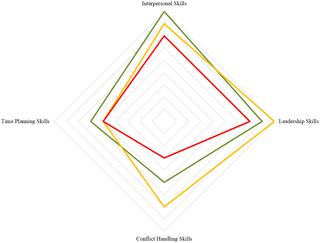Our official English website, www.x-mol.net, welcomes your feedback! (Note: you will need to create a separate account there.)
Managerial capacity among district health managers and its association with district performance: A comparative descriptive study of six districts in the Eastern Region of Ghana.
PLOS ONE ( IF 3.7 ) Pub Date : 2020-01-22 , DOI: 10.1371/journal.pone.0227974 Anne Christine Stender Heerdegen 1, 2 , Moses Aikins 3 , Samuel Amon 3 , Samuel Agyei Agyemang 3 , Kaspar Wyss 1, 2
PLOS ONE ( IF 3.7 ) Pub Date : 2020-01-22 , DOI: 10.1371/journal.pone.0227974 Anne Christine Stender Heerdegen 1, 2 , Moses Aikins 3 , Samuel Amon 3 , Samuel Agyei Agyemang 3 , Kaspar Wyss 1, 2
Affiliation

|
INTRODUCTION
District health managers play a pivotal role in the delivery of basic health services in many countries, including Ghana, as they are responsible for converting inputs and resources such as, staff, supplies and equipment into effective services that are responsive to population needs. Weak management capacity among local health managers has been suggested as a major obstacle for responsive health service delivery. However, evidence on district health managers' competencies and its association with health system performance is scarce.
AIM
To examine managerial capacity among district health managers and its association with health system performance in six districts in the Eastern Region of Ghana.
METHODS
Fifty-nine district health managers' in six different performing districts in the Eastern Region of Ghana completed a self-administered questionnaire measuring their management competencies and skills. In addition, the participants provided information on their socio-demographic background; previous management experience and training; the extent of available management support systems, and the dynamics within their district health management teams. A non-parametric one-way analysis was applied to test the association between management capacity and district performance, which was measured by 17 health indicators.
RESULTS
Shortcomings within different aspects of district management were identified, however there were no significant differences observed in the availability of support systems, characteristics and qualifications of district health managers across the different performing districts. Overall management capacity among district health managers were significantly higher in high performing districts compared with lower performing districts (p = 0.02). Furthermore, district health managers in better performing districts reported a higher extent of teamwork (p = 0.02), communication within their teams (p<0.01) and organizational commitment (p<0.01) compared with lower performing districts.
CONCLUSION
The findings demonstrate individual and institutional capacity needs, and highlights the importance of developing management competencies and skills as well as positive team dynamics among health managers at district level.
中文翻译:

地区卫生经理之间的管理能力及其与地区绩效的关系:对加纳东部地区六个地区的比较描述性研究。
引言区域卫生经理在包括加纳在内的许多国家中,在提供基本卫生服务方面起着关键作用,因为他们负责将投入和资源(如人员,物资和设备)转化为能够满足人口需求的有效服务。有人建议,地方卫生管理人员管理能力薄弱是提供及时卫生服务的主要障碍。但是,缺乏关于地区卫生经理的能力及其与卫生系统绩效的关联的证据。目的研究加纳东部地区六个地区的地区卫生经理的管理能力及其与卫生系统绩效的关系。方法59个地区卫生经理 在加纳东部地区的六个不同表演区中,他们完成了一份自我管理的问卷,以衡量其管理能力和技能。此外,参与者还提供了有关其社会人口统计学背景的信息;先前的管理经验和培训;现有管理支持系统的范围,以及其区域卫生管理团队内部的动态。应用非参数单向分析来测试管理能力与地区绩效之间的关联,该关联由17个健康指标进行了衡量。结果发现了地区管理各个方面的缺陷,但是在支持系统的可用性方面没有发现显着差异,不同表现地区的地区卫生经理的特征和资格。与绩效较低的地区相比,绩效较高的地区中区域卫生经理的总体管理能力要高得多(p = 0.02)。此外,与绩效较低的地区相比,绩效较好的地区的地区卫生经理报告的团队合作程度更高(p = 0.02),团队内部的沟通(p <0.01)和组织承诺(p <0.01)。结论研究结果表明了个人和机构的能力需求,并强调了发展管理能力和技能以及区级卫生经理之间积极的团队动态的重要性。与绩效较低的地区相比,绩效较高的地区中区域卫生经理的总体管理能力要高得多(p = 0.02)。此外,与绩效较低的地区相比,绩效较好的地区的地区卫生经理报告的团队合作程度更高(p = 0.02),团队内部的沟通(p <0.01)和组织承诺(p <0.01)。结论研究结果表明了个人和机构的能力需求,并强调了发展管理能力和技能以及区级卫生经理之间积极的团队动态的重要性。与绩效较低的地区相比,绩效较高的地区中区域卫生经理的总体管理能力要高得多(p = 0.02)。此外,与绩效较低的地区相比,绩效较好的地区的地区卫生经理报告的团队合作程度更高(p = 0.02),团队内部的沟通(p <0.01)和组织承诺(p <0.01)。结论研究结果表明了个人和机构的能力需求,并强调了发展管理能力和技能以及区级卫生经理之间积极的团队动态的重要性。与绩效较低的地区相比,团队内部的沟通(p <0.01)和组织承诺(p <0.01)。结论研究结果表明了个人和机构的能力需求,并强调了发展管理能力和技能以及区级卫生经理之间积极的团队动态的重要性。与绩效较低的地区相比,团队内部的沟通(p <0.01)和组织承诺(p <0.01)。结论研究结果表明了个人和机构的能力需求,并强调了发展管理能力和技能以及区级卫生经理之间积极的团队动态的重要性。
更新日期:2020-01-23
中文翻译:

地区卫生经理之间的管理能力及其与地区绩效的关系:对加纳东部地区六个地区的比较描述性研究。
引言区域卫生经理在包括加纳在内的许多国家中,在提供基本卫生服务方面起着关键作用,因为他们负责将投入和资源(如人员,物资和设备)转化为能够满足人口需求的有效服务。有人建议,地方卫生管理人员管理能力薄弱是提供及时卫生服务的主要障碍。但是,缺乏关于地区卫生经理的能力及其与卫生系统绩效的关联的证据。目的研究加纳东部地区六个地区的地区卫生经理的管理能力及其与卫生系统绩效的关系。方法59个地区卫生经理 在加纳东部地区的六个不同表演区中,他们完成了一份自我管理的问卷,以衡量其管理能力和技能。此外,参与者还提供了有关其社会人口统计学背景的信息;先前的管理经验和培训;现有管理支持系统的范围,以及其区域卫生管理团队内部的动态。应用非参数单向分析来测试管理能力与地区绩效之间的关联,该关联由17个健康指标进行了衡量。结果发现了地区管理各个方面的缺陷,但是在支持系统的可用性方面没有发现显着差异,不同表现地区的地区卫生经理的特征和资格。与绩效较低的地区相比,绩效较高的地区中区域卫生经理的总体管理能力要高得多(p = 0.02)。此外,与绩效较低的地区相比,绩效较好的地区的地区卫生经理报告的团队合作程度更高(p = 0.02),团队内部的沟通(p <0.01)和组织承诺(p <0.01)。结论研究结果表明了个人和机构的能力需求,并强调了发展管理能力和技能以及区级卫生经理之间积极的团队动态的重要性。与绩效较低的地区相比,绩效较高的地区中区域卫生经理的总体管理能力要高得多(p = 0.02)。此外,与绩效较低的地区相比,绩效较好的地区的地区卫生经理报告的团队合作程度更高(p = 0.02),团队内部的沟通(p <0.01)和组织承诺(p <0.01)。结论研究结果表明了个人和机构的能力需求,并强调了发展管理能力和技能以及区级卫生经理之间积极的团队动态的重要性。与绩效较低的地区相比,绩效较高的地区中区域卫生经理的总体管理能力要高得多(p = 0.02)。此外,与绩效较低的地区相比,绩效较好的地区的地区卫生经理报告的团队合作程度更高(p = 0.02),团队内部的沟通(p <0.01)和组织承诺(p <0.01)。结论研究结果表明了个人和机构的能力需求,并强调了发展管理能力和技能以及区级卫生经理之间积极的团队动态的重要性。与绩效较低的地区相比,团队内部的沟通(p <0.01)和组织承诺(p <0.01)。结论研究结果表明了个人和机构的能力需求,并强调了发展管理能力和技能以及区级卫生经理之间积极的团队动态的重要性。与绩效较低的地区相比,团队内部的沟通(p <0.01)和组织承诺(p <0.01)。结论研究结果表明了个人和机构的能力需求,并强调了发展管理能力和技能以及区级卫生经理之间积极的团队动态的重要性。


























 京公网安备 11010802027423号
京公网安备 11010802027423号